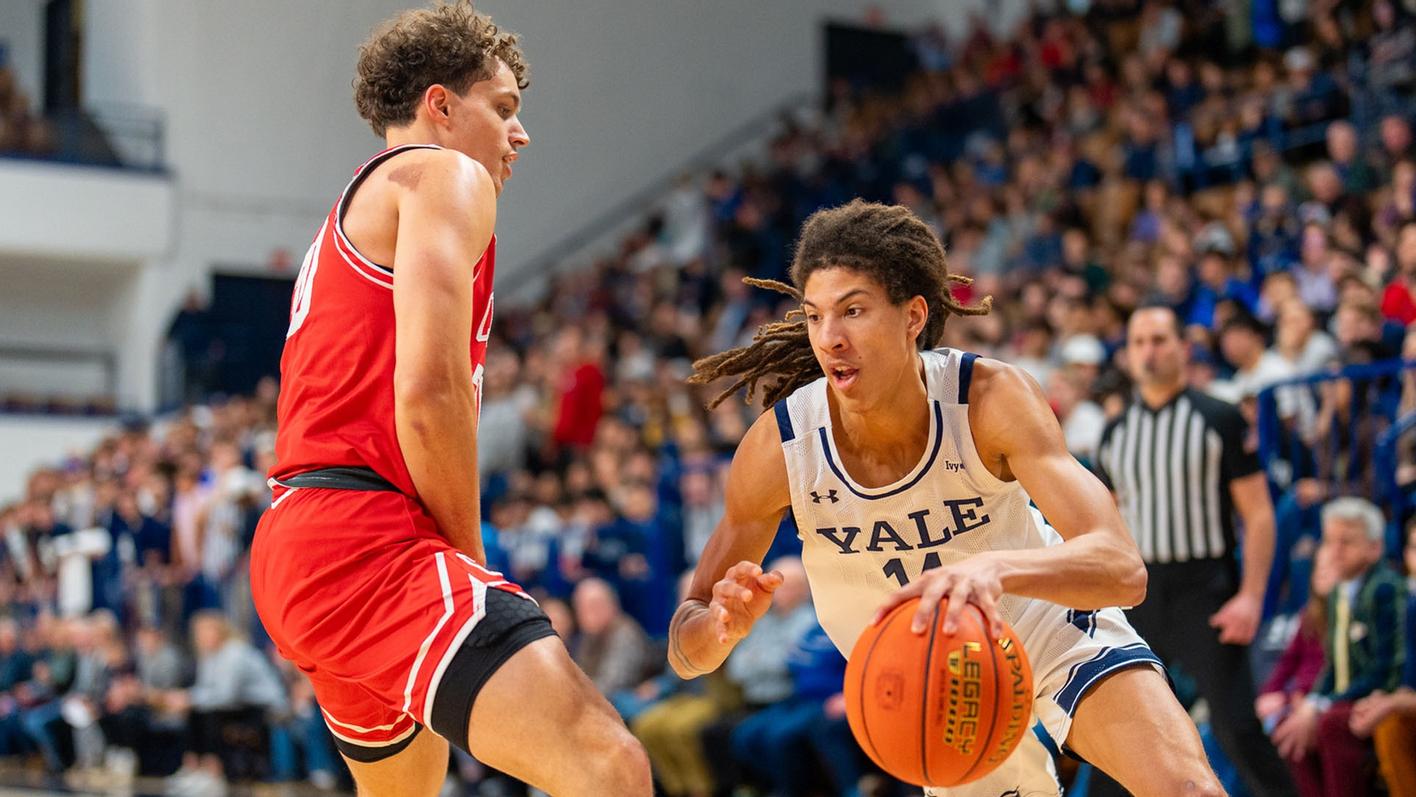MEN’S BASKETBALL: Ivy League eyes first ever at-large bid to March Madness
Yale, Princeton and Cornell have all played at historically high levels this year, calling into question the Ivy League’s reputation as a “one-bid league.”

Courtesy of David Schamis
NEW YORK CITY –– The Ivy League has never sent two teams to play in March Madness. This season, standout play from Yale (20–9, 11–3 Ivy), Princeton (24–3, 12–2) and Cornell (22–6, 11–3) could challenge that precedent.
Heading into the 2023-2024 Ivy League tournament, the three teams’ combined win-loss record of 66–18 (78.6 percent) is the best since the League’s 1969-1970 season. All three teams are ranked inside kenpom.com’s top 100 ratings for the first time since the site’s launch in 1999.
“I suspect that several teams in our league deserve a spot in the field this year,” Yale head coach James Jones told the News. “But given the way the metrics work, I don’t think we’ll get a chance.”
Of the 68 available spots in the NCAA tournament, 32 are awarded automatically to the champions of each conference. The next best 36 teams in the nation, as determined by the NCAA’s selection committee, receive “at-large bids.” But the committee’s criteria for determining at-large bids — reliant on evaluating the quality of a team’s wins and losses — works against the Ivy League’s favor.
Playing in the Ivy League limits each team’s ability to play against high-major talent in the regular season. Yale, Princeton and Cornell are all likely to wind up with better win percentages than most of the at-large teams selected, who typically come from high-major conferences such as the Big-12, SEC or Big East.
“Villanova’s got 15 losses and they’re considered a bubble team,” Jones said, “And they lost to Penn, they lost to Drexel, they lost to Saint Joes. None of which are gonna even sniff the NCAA tournament. It’s just hard to believe.”
Villanova (18–15, 10–10 BEC), a team from the Big East conference, is listed by ESPN as a “bubble” team, or a team on the cusp of making the tournament. According to ESPN’s predictions, ten different conferences will earn at least two bids to the tournament, but not the Ivy League.
Ivy League teams do have the opportunity to play non-conference teams during the early season portion of their schedule but often have difficulty scheduling games against top programs.
“We’ve called every school we can possibly call,” Princeton head coach Mitch Henderson said, referring to the team’s non-conference scheduling. “We feel like we can compete with and beat every team in the country.”
The Tigers went 12–1 in their non-conference schedule this season, but did not face any top 50 ranked opponents. They are currently the only team ranked in the NET’s top 50 who have not faced another team in the top 50.
When given the opportunity, Ivy League teams have proven that they’re capable of beating top-tier opponents. Since 2010, both Cornell and Princeton have made runs to the NCAA tournament’s round of 16, beating nationally ranked programs such as Arizona, Wisconsin and Temple. In 2016, Yale — playing in the NCAA tournament for the first time under Jones — defeated No. 5 seeded Baylor in the first round.
If Yale does schedule high-major opponents during the regular season, they’ll have to face them in their opponents home gym. This season, Yale played No. 15 ranked Gonzaga and No. 22 Kansas on the road , and held double-digit leads against both teams before going on to lose.
Jones noted that scheduling games has become increasingly difficult in recent years, which he attributed to the league’s growing success. UConn, the lone high-major program in Connecticut, has not played Yale since the Bulldogs defeated the Huskies in 2014.
“As of right now, I don’t know that we have any non-conference game scheduled for next year,” Jones said. “When I first got the job at Yale I was done with scheduling in December of the following year.”
Despite the historically strong conference field, Jones acknowledged the uphill battle Ivy League teams face towards earning an at-large bid to the tournament, jokingly calling it “a sandwich I have to eat that doesn’t taste too good.”
As it stands, No. 1 seeded Princeton would likely have the strongest case for an at-large bid due to their top 50 NET ranking, should they lose. This weekend, Yale hopes to avoid the discussion altogether by winning the Ivy League tournament and earning the conference’s automatic bid.
Yale is set to face No. 3 seeded Cornell at 2 p.m. on Saturday in the semifinals of the Ivy League tournament.







